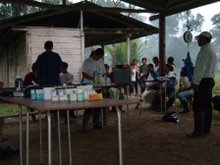I'm on my second month of visiting rotations in surgical specialties, and while the experience has been mentally and physically demanding (as my family can tell you from all my complaining), it has also been tremendously rewarding. I truly love surgery, and just like most other milestones in life, what was initially a pipe dream is shaping into something more perfect than I could have ever anticipated.
I was always drawn to the surgical field, but it's only after several weeks of being on service that I'm starting to realize why I love it so much. Surgery, particularly vascular surgery, is intense. It's like a sport: you train for it, hone your skills, go out to battle, and continually analyze your performance to improve. Every doctor develops the practice of introspection to increase his competence. However, in surgery, it's not only knowledge but technical excellence. And the course of events for a patient changes so acutely with the surgeon's involvement that perfect action is even more crucial.
I'm on vascular surgery right now, and we've just had a couple of tough cases with major complications, including death. Each of these times, the patient had a potentially fatal, surgically curable disease (both, in fact, were AAA's). One of those patients is no longer alive (iliac vein injury), and the other does not have a duodenum (we cut through it). Both of these are major, predictable complications of AAA surgery. However, at the end of the day, they walked into the hospital well, and in our hands, suffered more than they were helped. The transaction is clear; we hurt those patients more than we helped them. Nowhere to hide.
One of those cases will certainly be discussed at Morbidity and Mortality conference next week. The chief resident will stand up in front of the entire surgery housestaff to go over the case with a fine-tooth comb and offer up our actions to critical minds. We will bear witness against ourselves and take responsibility for ourselves. This is what I love about surgery: nowhere to hide.
In surgery, you can't help but be honest. You can't help but be compulsive, hardworking, caring. If you see a little bleeding before you close the fascia, you don't wave it away assuming it will stop on its own. You go back and explore, you remove hard-earned sutures if you need to, because you know that bleed will declare itself as a hematoma later on if you don't. On an exploratory laparotomy, you run the bowel meticulously looking for injury, knowing that if you don't, the patient will develop colonic necrosis and decline rapidly. There's no way around doing your very best for the patient.
That's what I love.
Thursday, November 11, 2010
Subscribe to:
Posts (Atom)




